| Reviews & Columns |
|
Reviews DVD TV on DVD Blu-ray 4K UHD International DVDs In Theaters Reviews by Studio Video Games Features Collector Series DVDs Easter Egg Database Interviews DVD Talk Radio Feature Articles Columns Anime Talk DVD Savant Horror DVDs The M.O.D. Squad Art House HD Talk Silent DVD
|
DVD Talk Forum |
|
|
| Resources |
|
DVD Price Search Customer Service #'s RCE Info Links |
|
Columns
|
|
|
Beneath The 12-Mile Reef, Raiders From Beneath The Sea, Down to the Sea in Ships (Fox Cinema Archives Triple Feature)
One big, fat flounder, one goofball fish story...and one superlative seafaring "coming of age" actioner that should be a classic--it's one of the finest of its kind I've seen. 20th Century-Fox's Cinema Archives line of hard-to-find library and cult titles has released Beneath the 12-Mile Reef, Raiders From Beneath the Sea, Down to the Sea in Ships, a 3-disc triple feature of previously released Cinema Archives titles. I believe these titles are still available individually, so picking up this triple will depend on what you may already own, or if the themed gathering--seafaring adventure for this set, obviously--is to your liking. Now...right off the bat: aspect ratio problems have plagued the Cinema Archives line from the beginning, and potential buyers want to know right up front if there are any hiccups with a new release. That's not a problem with 1949's fullscreen Down to the Sea in Ships, obviously, but what about the other two? Beneath the 12-Mile Reef's anamorphically-enhanced widescreen transfer is correct, while 1964's cheapie Raiders From Beneath the Sea is a fullscreen transfer. That's a problem, right? Well, yes and no.... Let's look at the three movies.
BENEATH THE 12-MILE REEF
"You See It Without Special Glasses!"
Broad, bogus widescreen transformation of Romeo and Juliet into rival Florida sponge divers, rescued only by composer Bernard Herrmann's remarkable score. One of Fox's (sorta) historically important titles: Beneath the 12-Mile Reef, the 1953 "epic" shot in CinemaScope (either the second or third feature in that milestone widescreen process), lensed on location in the Keys and on the Florida Gulf coast, and starring a, um...rather colorful cast of hambones including Robert Wagner, Terry Moore, Gilbert Roland, J. Carrol Naish, Richard Boone, and Peter Graves. Frequently ridiculous moviemaking, from Robert D. Webb's flat direction, the ersatz "socially conscious" script from ace scripter A. I. Bezzerides, and the reliably bad thesping from everyone, Beneath the 12-Mile Reef does however sport a big, lush, notable score by master Bernard Herrmann, so crank up your amplifier and go do the dishes until the silly rubber octopus attack comes along. No extras for this pretty good anamorphically enhanced (good on you, Cinema Archives) widescreen release.
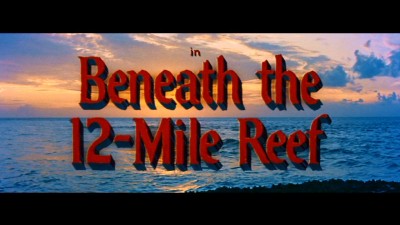
The sponges, you see...they are a'thinning out, no? And preening, strutting Greek-American sponge diver Mike Petrakis (Gilbert Roland) is in hoch up to his conches with Greek-American loan shark Demetrios Sofotes (Jacques Aubuchon), who wants his 12 thousand clams or else Mike's boat, The Aegli. So, if overpoweringly masculine Mike wants to keep wife Mama Petrakis (Angela Clarke), daughter (with the tough-to-pronounce) Greek name "Penny" (Gloria Gordon), and especially eager-beaver son Tony (Robert Wagner) in plenty of chowder, he's got to go back out to deep water to the beautiful, dangerous 12-Mile Reef, where the bigger, better sponges practically litter the ocean floor...and where his older son Peter had previously met his doom in the treacherous waters. However, when Tony wins a diving contest and is blessed by the local priest, papa Mike believes his luck has changed, so instead of the Reef, Mike opts for easy pickings in the 'glades--territory he knows is traditionally "off-limits" to Greek spongers, since the "Conches" (the script's fuzzy way of saying they're probably/maybe/sorta WASPyish-Americans who apparently don't like anybody who doesn't look like them) have always fished there. Sure enough, the minute the Aegli crew gets a boatload of sponges, creepy "pirate" Arnold Dix (Peter Graves) threatens to chop papa Mike's air hose unless the sponges are handed over pronto to head White Oppressor, Thomas Rhys (Richard Boone). Later, in Key West, Mike goes looking for payback, but backs down when confronted with the Conches' superior numbers. Tony, however, lays on his Hollywood-approved ethnically-correct boisterous Greek charm, and slays Gwyneth Rhys (Terry Moore), Thomas' daughter and possessive, deluded Dix's would-be girlfriend. You can pretty much write the rest of this yourself, including escalating violence from Dix (he really is a Dix), the untimely death of a preening, strutting, overpoweringly masculine central character, the star-crossed lovers' idyllic runaway interlude...and a giant octopus helping a boy become a man (no, not that way...).

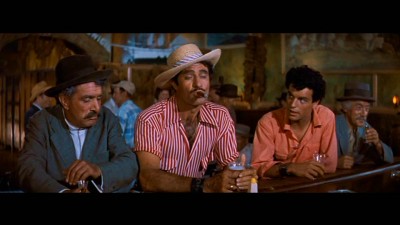
Even I fell into the trap of mentioning one of Beneath the 12-Mile Reef's two main claims to fame: its second or third spot in the initial roster of CinemaScope productions (How to Marry a Millionaire actually finished shooting before the first-started The Robe, but was held up to allow the Biblical epic to bow ahead...with Beneath the 12-Mile Reef's filming coming in somewhere inbetween). Of course that bit of anamorphic trivia for this soggy deep sea drama means nothing to most viewers today, and to be honest, I'm not sure it meant quite as much to ticket buyers back then, as historians would have you think now. There's no doubt that the name "CinemaScope" meant shekels in the tills back in '53. It's important to remember, though, that just because Beneath the 12-Mile Reef was the third CinemaScope picture, it wasn't only the third movie in "wide-screen" that the public saw that year. Other studios--Fox, too, eventually--were suddenly (and cheaply) hard and soft-matting their releases left and right when they heard about anamorphic CinemaScope; when Oscar-nominated Beneath the 12-Mile Reef lost the Best Cinematography that year, it lost it to Paramount's Shane, which had been cropped and released "wide" almost 9 months before Beneath the 12-Mile Reef--a grotesque irony since Shane's cropping was done against the horrified protestations of director George Stevens, who never intended his meticulously-composed 1.37:1 frames (the movie was actually shot in '51) to be mutilated that way. Rentals returned to Fox certainly proved that CinemaScope could help sell an otherwise hackneyed, cheapjack adventure like Beneath the 12-Mile Reef...but Reef's grosses were nowhere near as impressive as either The Robe or How to Marry a Millionaire.

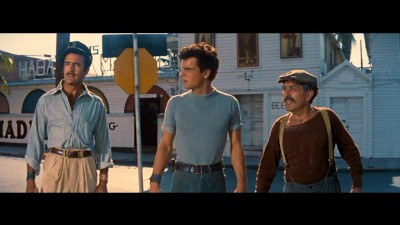
So discounting the chintzy allure of its minor CinemaScope pedigree, one is left with just the movie itself...and boy is it a whale of a minnow. If the anamorphic lens had been 86ed from the production, it's doubtful that Beneath the 12-Mile Reef would have qualified for much more than a spot on a Fox double bill, such is its cliched, overly-familiar storyline (no matter how "exotic" its pasted-on locale is) and its surprisingly inept execution (more about that later). Apparently, according to one or two new reviews I've read online, what's primarily interesting now about Beneath the 12-Mile Reef, is its sociology; specifically, the so-called clash of cultures between the Greeks and the "Conches" here, with the brave little Greeks battling the vicious, avaricious "Conches" for economic survival. Now, I don't want to read too much into Beneath the 12-Mile Reef, not only because clearly it's such a nothing little programmer, but also because the screenwriter himself, A. I. Bezzerides, made statements to the effect that latter-day "film historians" (yeech) had extrapolated intent and meanings into his movies that he hadn't planned or even thought of (see his thoughts on Aldrich's Kiss Me Deadly). Is that also the case here, in Beneath the 12-Mile Reef? Was he trying to say something "meaningful" about ethnicity in this tale of sponge fishers, or was he, as he claimed with Kiss Me Deadly, "just having fun?"
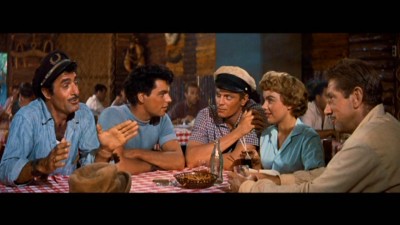

Now, I never expect Hollywood movies, then or now, to accurately convey the true details and specifics of the situations they present on the screen. I didn't know a thing about sponge fishing or diving when I watched Beneath the 12-Mile Reef, so I read up on it a little bit before I wrote this, and not surprisingly, Bezzerides (and/or whoever else came along and perhaps reworked his script?) got almost all of it wrong here. I'm not going to write a term paper on sponge fishing (my three loyal sponge diver readers just groaned), but it is important to see what Bezzerides changed when he wrote the screenplay. Granted, I'm no one-day expert on sponge fishing, but nothing I read indicated that the Greeks who fished for sponge off the coast of Florida were "oppressed" by WASPy-like competitors. On the contrary, everything I've read seems to indicate the Greeks owned sponge fishing there; that they were asked to come to Florida and turn a fledgling local economy into a world-wide one, and that they were responsible for bringing the advanced technology of helmeted/air hose diving to the States. And they made lots of money doing so. They were hardly "underdogs" in the real-life sponge fishing world...and yet they are here. Beneath the 12-Mile Reef even screws up the fundamental basics of that fishing. The movie implies that Mike is forced to go deeper as a last resort, because the sponge fields are all tapped out. As a result, the implication is, all would be right if the Greeks were allowed to "hook" the sponges in the 'glades, where the lazy "Conches" rule the roost. In actuality, the Greek sponge divers--a truly fearless, proud group who routinely performed long underwater dives that nobody would attempt today--willingly went out into deeper water where the bigger sponges were; "hook" sponging only netted smaller, inferior sponges, and had long-played out in Florida by the 1950s. Indeed, sponge fishing as a Florida industry was almost dead by the time Beneath the 12-Mile Reef came out, but not because cold, venal WASPy Whites were oppressing kindly, big-heart, laughing Greeks...but because the sponge fields suffered wide infection, and the cheaper, more easily mass-produced synthetic sponges were first being marketed. So if somehow you find yourself seriously reading ethnic and economic clashes into the sponge fishing world of Beneath the 12-Mile Reef of all things, you'd better know you're reading something that was made up whole-cloth from a Hollywood screenwriter.

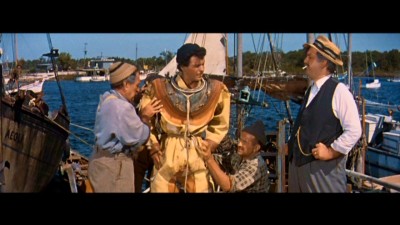
Despite his past works that dealt with such issues, I don't think for a moment that Bezzerides intended a bit of action-filled fluff like Beneath the 12-Mile Reef to be a serious screed, sly or broad, on American ethnic relations during tough economic times (someone out there reviewing movies does, though...). However, it's clear, in his efforts to jazz up the old Shakespeare plot and make it somehow "dramatic" within the context of the rather undramatic framework of day-in and day-out sponge fishing, Bezzerides fell back on some nebulous--not to mention facile--character and plot motivations and conflicts that fall vaguely along cheap ethnic lines. And that's what so annoying about the movie--the cheap easiness of the (false) conflict. Boone's and Graves' characters could easily have been made Greeks; after all, a rivalry between similar families in the sponge world would have been more faithful to the original source (it would be a couple of years before Broadway's West Side Story used the Shakespearean framework for ethnic conflict). At least then the differences could have been clearly spelled out. In Beneath the 12-Mile Reef, though, everything is diffused, leaving it up to the audience to say, "Oh, that one mean group is really white white-looking...and the other nice group isn't so much," (it's amusing to read these other critics mention how the "Conches" are keeping the Greeks down...but those same critics don't mention the Greek moneylender who's actively squeezing Gilbert Roland for repayment of a loan, forcing him to go into different waters). We're never presented with any explanation from the "Conches" on why they view themselves apart from the Greeks, other than a declaration that the 'glades have always been their hunting grounds. That's it for the Conches' so-called "racism," as read by some critics today (Boone states, "Tradition makes its own laws,"). And yet, we're given lots of scenes of Greek tradition, which we're rightly supposed to admire (the Greeks didn't consider their corner of the ocean theirs, too?). It's all laughably ambiguous and muddled, with the only racism hinted at possibly coming from the screenwriter himself...and maybe some of those critics today, who approve of Beneath the 12-Mile Reefs foggy insinuations.
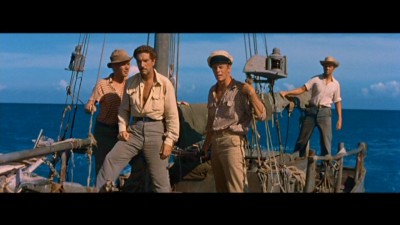

Sociology aside, Beneath the 12-Mile Reef is sloppy beyond belief, with far too many wilted dialogue scenes and far too little underwater action (which is usually reserved for slow, ponderous "travelogue" vistas used to show off the CinemaScope properties), as well as huge continuity problems that begger belief (the whole timeline between Roland's death and Wagner's return home with Moore is completely screwed up--how long has he been gone? A day? A month?). Director Robert D. Webb, with more credits as a second unit director than as a top-line helmer, can't find any rhythm in individual scenes, creating a dead, hollow feeling to the proceedings that's fatal. His handling of the actors seems to consist of nothing more than making sure they're placed dead center in the vast CinemaScope frame; eliciting rounded performances is obviously out of his grasp. Gilbert Roland, a skilled pro, is amusing here for all the wrong reasons, preening and posing it up something awful in lieu of any shadings to his stereotypical character (when he returns to land, and wags his eyebrows like Groucho before thickly laying this one on his wife-- "When we're alone, I'll, ah..say a big 'Hello,', uh mama? Hmmm?"--the effect is deliriously monstrous). Richard Boone has nothing to do here with his potentially intriguing character (he's understanding and sympathetic...and then he's a goon), while Peter Graves is comically inept as a vicious bully (his mock-fighting skills are hilariously stiff and gawky). I've never understood the appeal of Terry Moore, so when I see her grotesque attempts at pushme-pullyou flirting with Graves and Wagner, it's par for the course for this 50s starlet. As for Wagner, he wins the movie's worst thesping award hands-down (quite a feat). With his inky-black, permed hair making him look like a cross between the comic's Dondi and actress Ruth Roman, Wagner's unmistakable and totally inappropriate polish and good manners mark him as a most unusual working stiff, with his attempts at youthful Greek bravado outlandishly surreal (the punishment of a permanent photographic record of Wagner's delivery of "I'm a very beautiful young man!" almost makes up for anything that might have happened on The Splendour). Thank god composer Bernard Herrmann is around, penning yet another eerie, mesmerizing score that compares favorably to his other fantasy movie scores like Jason and the Argonauts and The Tree Worlds of Gulliver. Scenes that don't work from a dialogue or visual standpoint, such as Roland's description of the Reef, somehow come off better than they should, owing to the overwhelming power of Herrmann's music (it even helps the decidedly underwhelming, too short octopus attack--the dubious action "highlight" of Beneath the 12-Mile Reef). Having made that score possible, Beneath the 12-Mile Reef's production is to be commended...but only for that creation.
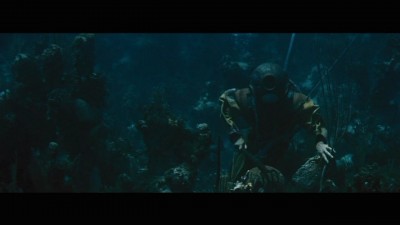
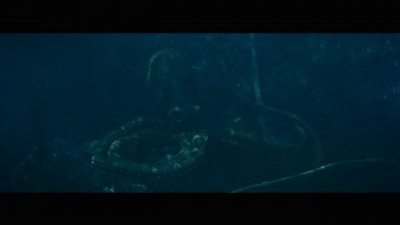
The DVD:
The Video:
Fox's Cinema Archives line can't help but confuse its customers. The back cover states this is "4:3 (letterbox)," when in reality the transfer for Beneath the 12-Mile Reef is a 2.40:1 anamorphically enhanced widescreen transfer that's quite bright and colorful, with minimal grain, some muddiness during dissolves, and a sharp image. Nice...so why turn off potential buyers with the wrong ratio info on the case?
The Audio:
The Dolby Digital English 2.0 stereo mix is exceptionally good for one of these Cinema Archive releases, with a clean, generally hiss-free sound, and a hefty re-recording level. No subtitles or closed-captions.
The Extras:
No extras for Beneath the 12-Mile Reef.
Final Thoughts:
Inept, sodden junk, enlivened only by Bernard Herrmann's dark, foreboding, fantastical score. Who cares if it was in CinemaScope? Pop it in and listen to the score. For that reason only, you can rent Beneath the 12-Mile Reef.
RAIDERS FROM BENEATH THE SEA
Generally crappy--but still watchable--B noir heist programmer. Raiders from Beneath the Sea, a cheapo 1964 Lippert production released by Fox, directed by Maury Dexter, scripted by Harry Spalding, and starring Ken Scott, Merry Anders, Russ Bender, Booth Colman, and Garth Benton, has a few good lines here and there, and the impressive sights of Catalina Island and Merry Anders in a bikini. More than a few unintentionally silly moments, though, make Raiders from Beneath the Sea an acceptable time-killer for fans of cheapjack 60s exploiters. No extras for this so-so full-screen transfer (more about that below).
Scuba diver and former salvager Bill Harper (Ken Scott), bankrupt and mooching dimes off his hot wife, Dottie (Merry Anders), now works rent-free as an apartment house manager...with no salary for the IRS to garnish. His creepy pervert brother, handyman Buddy (Garth Benton), lives there, too, but he's far too busy chasing tail and lusting after Dottie to do much maintenance around the place. Bill, desperate to change his circumstances, comes up with a plan: on the day after Labor Day, scuba to the dock at Catalina Island, walk uptown--in full gear--to rob the island's bank's holiday haul of a cool quarter of a million dollars, walk back to the dock, jump in to the ocean and swim underneath the ferry, attaching the loot to the boat's hull with magnets, all before Johnnie Law knows what's what. There're only a few problems. Troublemaker Purdy (Booth Colman) originally floated this caper to Bill, and now he wants in on the action, while Dottie wants Buddy out after he tries to rape her.
One of those 60s men's adventure magazine stories come life (Sex and Death with the Scuba Diving Bank Robbers!), Raiders from Beneath the Sea certainly doesn't come anywhere near delivering the thrills and action promised in that sweet, sweet one-sheet ("Like Monsters Out of the Deep They Came Ashore...Two Men Out to Seize a Million Dollar Haul!"). There's nothing remotely "monstrous" about Scott's and Benton's characters (we don't even get a shot of them underwater together), nor are they shooting for a million dollar score (apparently, the actual quarter million dollar prize in the movie wasn't enough for the Fox promotional department). However, I would imagine this cheaply-budgeted filler did fulfill its purpose: helping to put some coins, however few, into Fox's coffers during yet another contentious year for the company. Notoriously penurious producer Robert L. Lippert had been with Fox since the mid-50s, when the company's fortunes took its first serious nose-dive, and he had been providing the major with reliably profitable programmers like Raiders from Beneath the Sea for years. By 1964, Fox president Spyros Skouras was out after the twin calamities of Cleopatra and Something's Got to Give, and Darryl Zanuck was back as the company's chairman of the board, with his son Richard acting as president. Production was way down from the company's heyday (with pick-ups dominating the release roster), and a few major films helped keep the creditors at bay (the all-star What a Way to Go!, Zorba the Greek, Hush...Hush, Sweet Charlotte)...along with a lot of lower-budgeted moneymakers: Surf Party, The Day of the Living Corpse, The Horror of Party Beach, Shock Treatment, Witchcraft, The Earth Dies Screaming, Apache Rifles, The Pleasure Seekers.
Certainly, Raiders from Beneath the Sea belongs in the latter category, with a terribly cheap production (the sets are amusingly flimsy, and that "all skate" roller rink music is stunningly inappropriate) and boring TV-style direction from Maury Dexter (Maryjane, The Mini-Skirt Mob, Hell's Belles). Jack-of-all-trades scripter Harry Spalding(Curse of the Fly, Wild on the Beach, One Little Indian, The Watcher in the Woods), though, does create a viable (if completely familiar) noir framework here with the failed diver transitioning into crime with his sexually aggressive brother, organizing a precision heist with a predictable but acceptable fatalistic ending. Spalding even gets in some good lines here and there (when sunbathing Anders asks Scott to hook up her bikini top, he offers, "No way; they'd have me for restraint of trade,"). Thematic and simple mechanical problems, however, abound. The story fails to develop any kind of pervasive triangle between Scott, Anders and Benton (what the hell is "sex antagonism," anyway?), while the goofiness of Dexter's execution is sometimes hilariously inept (the whole frogmen walking down the deserted streets is a classic). Still...that hot-and-cold mixture of promising elements and hopeless maladroitness, along with the impressive sights of mid-60s Catalina Island and Merry Anders stripping to a sleazy beat, does help put Raiders from Beneath the Sea over as watchable dreck.
The DVD:
The Video:
Why aren't I telling you to skip this disc outright because it's been released full-frame? After all, that's my personal policy for compromised aspect ratios, right? Well...because, although it's not ideally formatted, it does look perfectly acceptable cropped with your TV to 1.78:1. The key to this allowance is the fact that the movie wasn't shot in any widescreen format, so matte issues are an extenuating consideration. Is this a deliberate open matte transfer by Fox? Doubt it...but there is a lot of dead information at the top and the bottom of the 1.37:1 image, and when cropped by your TV, the framing is dead-on. Sure the grain is bumped up considerably when you do this, and the image softens, but it does look correct. So...benefit of the doubt given (...and really: it's just so I don't tell people to skip a set that includes the superlative Down to the Sea in Ships). Overall, the image is a tad dark at times, but otherwise, not bad.
The Audio:
The Dolby Digital English mono audio track is re-recorded here at a solid level, with some hiss and little fluctuation. No subtitles or closed-captions available.
The Extras:
No extras.
Final Thoughts:
Goofy little heist noir. Raiders from Beneath the Sea is worth a look for fans of vintage 60s crime mellers, both for its (very) few pluses and its (very) amusing minuses. If you're a tolerant member of that small group, a rental is best for Raiders from Beneath the Sea.
DOWN TO THE SEA IN SHIPS
The offices of the Briggs-Harris Co. Whaling Masters, New Bedford, Massachusettes, 1887. Co-owner Captain John Briggs (Paul Harvey) has had enough, worrying about Captain Bering Joy (Lionel Barrymore) piloting his whaler, Pride of Bedford. Away at sea for four years, and due any minute to arrive back in port, no matter how much whale oil the Captain brings back, he's out with Briggs, the Board of Directors...and most importantly, their insurance company. Captain Joy, though, isn't so easily pushed aside, particularly when he brings in a record amount of whale oil this voyage. What troubles the Captain most, though, is his parentless grandson, Jed (Dean Stockwell). Having tried and tried to teach the boy his school lessons from books, Captain Joy is afraid if Jed doesn't pass his fourth grade examination, he'll be forced to stay on shore, with the Captain forced to stay behind, as well--something neither wants. Jed, unresponsive to the Captain's rote memorization technique, fails his exam; however, school master Bush (Gene Lockhart), a former cabin boy wash-out of the Captain's, is aware that the boy will be miserable on land, so he forces the teacher to change the boy's grade. Change is forced on the Captain, too: Briggs-Harris won't let the Captain sail without over-qualified First Mate Dan Lunceford (Richard Widmark) on board. Lunceford, a certified Master, is newly-schooled in the latest high-tech disciplines associated with whaling, such as marine biology--fancy "hogwash" that amuses crotchety old salt Joy. However, the Captain sees an opportunity for Jed's schooling: Lunceford's off-duty hours will be spent schooling the boy. At sea, the education-resistent boy soon cottons to father-figure Lunceford (who sees time spent with the boy as punishment by the Captain), while the Captain, holding fast to his word not to interact with any of the crew including his grandson, refuses to interfer, even when it's obvious the boy's love is turning away from his heartbroken grandfather to the more accessible Lunceford. When Lunceford disobeys the Captain and mounts an extras search party when Jed goes missing on his first whaling excursion, the Captain gratefully thanks Lunceford...before relieving him of duty (with the intention of putting him to shore at the first port)--an act he takes no pleasure in, but a necessary one the shattered, angry boy can't understand. When the Pride of Bedford smashes into an iceberg, Jed and Dan quickly learn not only how tough dying Captain Bering Joy is, but his true size as a man.
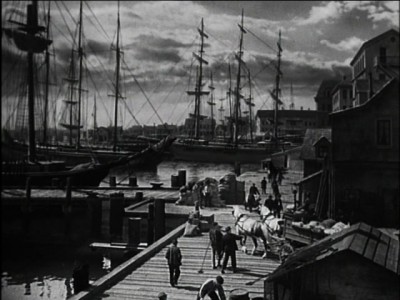
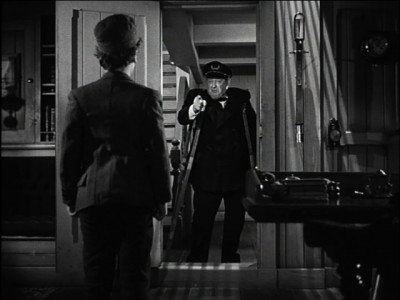
A remarkable movie: part family film, part coming-of-age drama, part epic-sized action-adventure--and completely out of left field for me. I can't recall even reading about Down to the Sea in Ships, until this triple feature came my way last week. I've always loved the sea-faring subgenre of action/adventure movies, from Mutiny on the Bounty (both versions) and The Sea Hawk, to Billy Budd and Huston's Moby Dick, just to name a few (and of course, any chance to plug that most-unfairly maligned classic, Doctor Dolittle, with his South Seas adventures on The Flounder). So how did this one sail by? Hard to say; maybe it wasn't a title that was widely included in those TV syndication packs back in the 70s? From what I could dig up on Down to the Sea in Ships's protracted production history, it sounds lucky anyone was finally able to see it. According to a few sources, studio head Darryl Zanuck considered this a prestige "road show" production worthy of an A-list cast and production. Since 1940, he had been trying to get it produced, going so far as to cast Tyrone Power and Laird Cregar (in the Barrymore role) while sending a second unit down to Mexico to film whaling footage (which was used in the final movie). WWII material restrictions, however, halted the movie's complicated production. In 1945, Power was still attached, but difficulties with the too-long, and thus too-expensive script, required further tweaking and postponement. Eventually, Zanuck felt the sea-faring epic would be a good vehicle to broaden the appeal of contract player Richard Widmark, who had made a name for himself playing villains in Fox's Kiss of Death and The Street with No Name. Barrymore and Stockwell were borrowed as a package from Metro, and the cameras finally started rolling in 1948, with a full-scale mock-up of Pride of Bedford located on a huge Fox soundstage (where the entire movie, except for previous stock footage and some new linking second unit sea footage, was filmed). Down to the Sea in Ships was released in the early part of 1949, to good reviews and respectable--if not outstanding--box office (Zanuck found out new star Widmark was still no Ty Power in terms of ticket sales, especially when headlining an expensive A-list project).
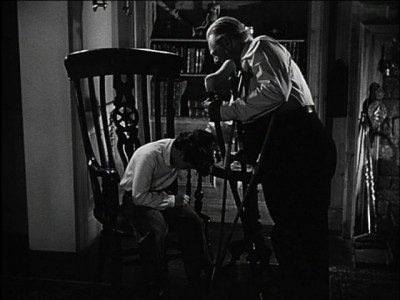
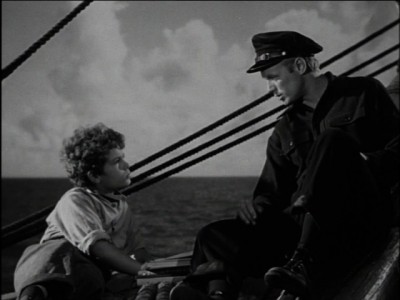
What struck me immediately about Down to the Sea in Ships is its careful, quiet first-half, which takes place on land, rather than sea. As scripted by Sy Bartlett (Twelve O'Clock High, The Big Country) and John Lee Mahin (My Son John, Heaven Knows, Mr. Allison), Down to the Sea in Ships takes an unusual amount of time to set into place the dynamics of Barrymore's gruff/tender grandfather and Stockwell's sensitive/tough grandson--a relationship that believably fractures when it's mirrored and duplicated when Widmark comes on the scene. Building one spare, sentimental (in the best sense of that now-maligned word) scene after another, the scripters and a surprisingly tender Henry Hathaway at the helm, softly convey Barrymore's intense love for the troubled boy, complicated by the Captain's doubts as to whether continuing the family's long tradition of going to sea, is really best for the boy who can't seem to learn (the bedroom scene, where both cry in their beds at the thought that they may have to stay in port, is deeply touching in a direct, emotional way that movies don't seem to trust audiences with anymore). The settling of this dilemma culminates in a rather remarkable scene where the Captain takes the boy for his exam, where he first tries to butter up school master Lockhart...when he realizes he washed out Lockhart decades ago, before the agonizing wait while the boy tests. It's a nerve-wracking scene, made resonant (and complex) when Lockhart, obviously ambivalent, has the scores changed, so the boy can be a "man" like he never was, through the "education of experience."
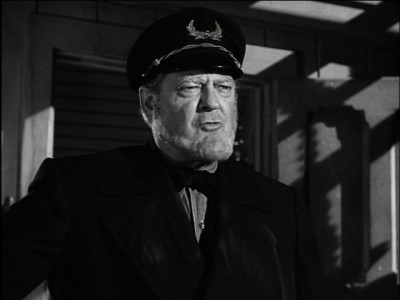
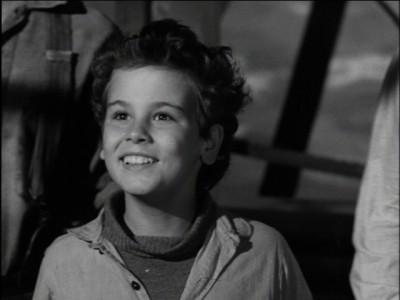
This notion of Stockwell's education--as well as men making hard decisions based on conflicting notions of "fairness" versus "rightness"--continues throughout Down to the Sea in Ships, even when the movie should seem to finally concern itself with whaling and adventure on the high seas. When Barrymore, hoping to punish Widmark by making him the boy's tutor, sees that instead the boy responds deeply to a new father figure, the movie could have taken the easy route, having the Captain exact revenge on the man who's taking his job, and his grandson. Instead, the Captain remains true to his word--he won't interfere with the crew, including his grandson, and he'll do what's best for the boy, not himself. Eventually, this father/son dynamic will play out with all three participants, before Widmark learns what he calls the "size" of Barrymore--a leader who makes an impossible decision that's more "right" than "fair." Barrymore keeps only one search boat out when his grandson is missing, so as not to endanger everyone else, something Widmark can't understand (a command Widmark also defies). When punishment time comes, Barrymore can't just wink away what Widmark did: he has to relieve Widmark of command, even though he knows Widmark saved his grandson, and that the boy will turn further away from his grandfather because of the harsh punishment. And when Barrymore finally admits to Widmark he can no longer cut it out in the boats, he graciously gives up command, a heroic act that deeply humbles Widmark.
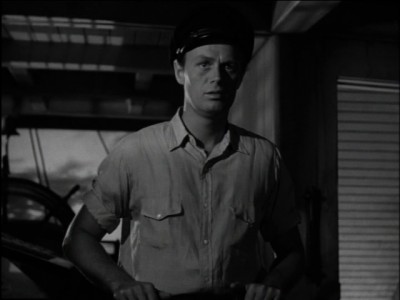
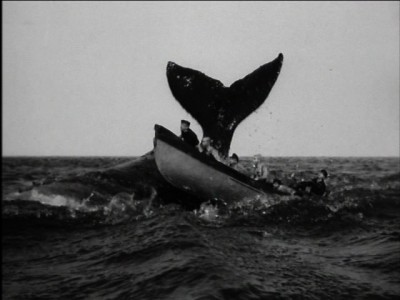
Inbetween these beautifully-written moments, director Hathaway indulges in a few spectacularly successful action scenes, including the first harpooning sequence (the model work is just fine for 1948), the rendering of the whale blubber (here Hathaway indulges in the semidocumentary feel of earlier hits of his, like Call Northside 777), and the nail-biting finale, where the ship smashes into an iceberg and is run aground on a hidden shelf, rocking and rolling repeatedly into the icewall as the crew scrambles to patch the hole. With the exception of one major continuity error (rather disappointingly, Widmark's left arm is shown smashed...but his right one is then patched), this sequence is as solid a "disaster" action scene as any I've seen, with Hathaway building unbearable tension as the men lower away on ropes, hoping to get out of the way as the ship rhythmically lurches and smashes into the ice. Typically, though, for Down to the Sea in Ships, this action is ultimately used to amplify the relationships, with the Captain rising one last time to the challenges of command, before Widmark and Stockwell come to a final appreciation of their place with the Captain. A sea-going adventure of uncommon, quiet understanding, it's all the more striking that it could incorporate such breathless action. Down to the Sea in Ships is one of the best sea movies/coming of age movies I've seen.
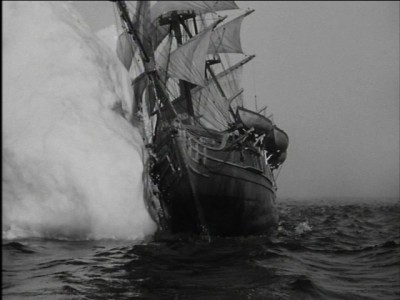
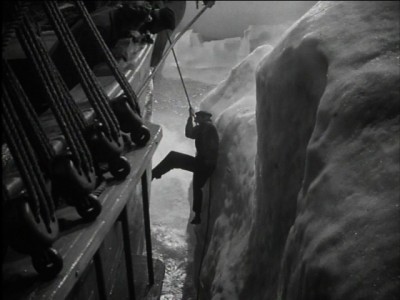
The Video:
The fullscreen, 1.37:1 black and white transfer for Down to the Sea in Ships looks okay, with a sorta darkish image, reasonably sharp, with okay contrast and minimal imperfections.
The Audio:
The Dolby Digital English mono audio track is serviceable, with a decent re-recording level...but definitely some squelchy moments. No subtitles or closed-captions.
The Extras:
No extras for Down to the Sea in Ships.
Final Thoughts:
Quiet, lovely...and spectacular. Down to the Sea in Ships takes a long, long time to get its dynamics right about a gruff sea captain doing what he thinks is best for his troubled grandson...even when he loses the boy to the man who wants the Captain's job. Superlative performances from the cast, sensitive direction and scripting, and remarkable action sequences make Down to the Sea in Ships one of the finest examples of the sea-faring adventure I've ever seen. I'm highly, highly recommending Down to the Sea in Ships.
Final Thoughts on the Set:
Since these three titles are available separately, buying this three pack will depend entirely on if you like the grouping. I wouldn't make anyone watch Beneath the 12-Mile Reef...but listening to its score is a big, big plus. Raiders from Beneath the Sea is a goof...but not an entirely unpleasant one, such are its enjoyable missteps. And Down to the Sea in Ships is a flat-out classic. So, overall...I'm recommending the Beneath the 12-Mile Reef, Raiders From Beneath the Sea, Down to the Sea in Ships set. Paul Mavis is an internationally published movie and television historian, a member of the Online Film Critics Society, and the author of The Espionage Filmography.


|
| Popular Reviews |
| Sponsored Links |
|
|
| Sponsored Links |
|
|
| Release List | Reviews | Shop | Newsletter | Forum | DVD Giveaways | Blu-Ray | Advertise |
|
Copyright 2024 DVDTalk.com All Rights Reserved. Legal Info, Privacy Policy, Terms of Use,
Manage Preferences,
Your Privacy Choices | |||||||












